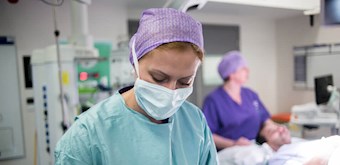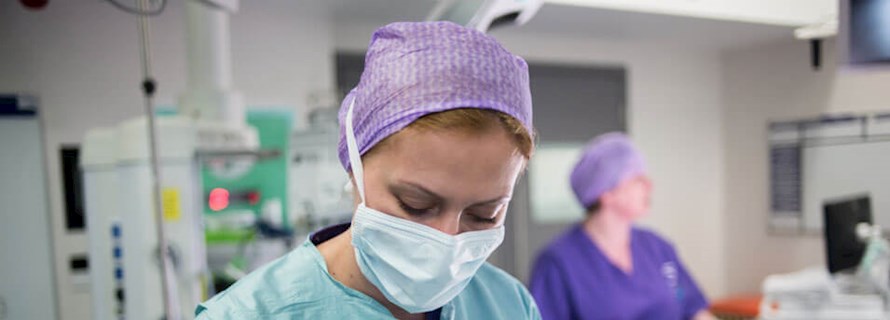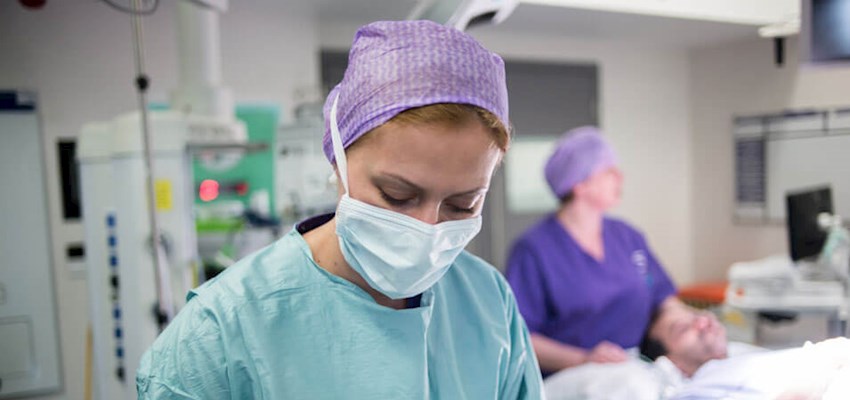ERAS programme
Enhanced recovery after surgery
HCA UK provides enhanced recovery after surgery (ERAS) to help get you back to full health as soon as possible.
About the ERAS programme
An ERAS programme can help to ensure that you are in the best possible health before having major surgery, and therefore allow you to recover more quickly afterwards.
It is based on an evidence based idea that the sooner a person gets out of bed, walks, eats and drinks after an operation; they will have a much shorter recovery time.
Patient care pathway: Enhanced recovery after surgery
This video outlines how the pathway works, what patients can do to make their surgical experience as seamless as possible, and what patients can expect during recovery from surgery.
Enhanced Recovery Programme
As a team, we ensure we are doing all we can to give you the best possible experience and outcomes. The Clinical Specialist Nurse (CNS) is the person who supports you throughout your surgical journey, before your operation, during your admission and after discharge but there are many other expert team members who will also be involved in your care.
You will work in partnership with your care team who will encourage you to use the information and tools we provide to take responsibility for your recovery.
Before your surgery
There are many things you can do prior to your surgery that will have an impact on your recovery post-surgery. It is beneficial to start being more physically active as early as possible, there is lots of evidence surrounding prehab for any form of surgery, these are improved quality of life, reduced hospital stay, reduced complications as well as empowering you to feel more in control.
Physical activity can be anything that gets you breathing faster and feeling warmer such as brisk walking, cycling or gardening. It is also beneficial to include strength building exercise such as yoga or weight training.
The role of the Dietitian is to offer expert nutritional advice and support both before and after surgery, as well as during your inpatient stay. Not every patient having surgery will need a direct review from a Dietitian, however, if you feel you’d benefit from seeing us please speak to the team looking after you. If you feel that you have lost weight or have had difficulty eating a balanced diet before your operation please contact your healthcare team and ask to speak to one of our dieticians.
There are other lifestyle changes you can make to improve your outcomes including stopping smoking and drinking alcohol. The earlier before your surgery date you can do this the better. If you are struggling with stopping smoking we recommend nicotine replacements but please also speak to your care team who can sign-post you to more smoking cessation advice. Please also inform your care team if you have any problems stopping your alcohol intake.
Before your surgery we will provide you with some special “pre-operative carbohydrate drinks” (for those patients without diabetes). It is important you follow instruction about how many and when to consume these as they have been shown to reduce metabolic stress during surgery and contribute to better outcomes.
Before your admission we will encourage you to think about how you are going to manage at home after you are discharged – you will be able to care for yourself, but you may need some help and support with housework/meals etc as you won’t be able to lift anything heavy for 6 weeks after surgery. If you think you will need help, we encourage you to put this in place before you come into hospital as we don’t want this to delay your discharge because we know that people recover much better at home.
Before your surgery we would like to understand a little more about your quality of life and the impact of your condition on your day-to-day health. This helps us assess your ‘baseline’ so that we can support you to get back to your baseline after surgery. You will hear this referred to as a “PROMs” (Patient Reported Outcome Measures) assessment. Please ensure you speak to your healthcare team about providing your consent for this.
During your surgery
The CNS will aim to see you most days during your stay with us, during which time it is also important that you are empowered to direct your own care. It is beneficial, for example that you work with your physios on regular movement and your dietitians about your nutrition requirements so you can return to independent activity as quickly as possible.
As a team we will work with you to ensure you have the right type and amount of pain relief to do these important activities. If at any point you don’t feel this is working for you, please let your healthcare team know as soon as possible.
If you have a PCA device (Patient Controlled Analgesia) we will aim to change this to tablets shortly after your operation (exactly when will depend on the exact operation you had). The strong pain relief medications can be very helpful in the first few days after surgery but they can also have side effects like slowing down the gut, so we aim to reduce them as soon as you are able to do all your important activities comfortably on tablets.
Patient goals of enhanced recovery after surgery
We aim for you to be DREaMing (DRinking Eating Mobilising) within 24 hours of your operation
DRinking - You will be encouraged to drink fluids as soon as you are awake and alert after your operation.
Eating – Adequate nutritional intake after surgery has been shown to reduce the risk of surgical complications, reduce length of hospital stay and overall improve surgical outcomes. You should be allowed to eat small portions of food (chewed well and slowly) the evening of your operation.
You may also be offered specialist high energy and high protein drinks to support your dietary intake. It is normal to have a reduced appetite after surgery but important to remember that your body needs more nutrition than usual after surgery to support the healing process.
Top tips:
- Try a ‘little and often’ approach to eating and drinking and have snacks in between your meals.
- Chew your food well and take your time.
- Choose nourishing drinks such as milkshakes, milky drinks, and smoothies. Drinks often fill us up less than food and can be a good source of energy and protein.
- If you are struggling with nausea, please ask for your anti sickness medication 30mins before mealtimes so that they are most effective.
- If you are struggling to choose from the hospital menu, please ask to speak to catering and alternatives or adjustments can be offered.
- Please bring in snacks from home or ask your visitors to.
- Focus on high calorie and high protein foods (the usual “healthy eating” recommendations don’t apply when you have a poor appetite!).
- You may wish to take a multivitamin supplement while your dietary intake is reduced or restricted.
Mobilising – Physiotherapy will play a key role in your recovery. You will be supported to get up the day of your surgery once you are awake and alert and your pain is controlled (if you are back very late from theatres this may take place the morning after your operation, but if you wish to sit out or stand for a couple of minutes and walk on the spot, please ask your nurse to assist you.). You will then be encouraged to sit out of bed and mobilise on the ward daily. You will not damage your wound or harm yourself in any way by mobilising soon after surgery, in fact evidence shows that this can improve your recovery outcomes. Getting moving early reduces the risk of complications such as chest infections and blood clots, it also aids wound healing, mental and physical well-being and improves digestive system function. Your Physiotherapist will provide you with advice on continued recovery and rehab at home prior to discharge from hospital.
After your surgery, at home
You will be allowed home when you are: eating and drinking, independent with daily activities including stoma care (if this is applicable to you), your bowels are working, wound/s healing and comfortable on oral pain relief. This could be between 3-5 days depending on your operation. You may be booked in for a longer stay just in case, but we aim to discharge when you have reached all your goals, and we are happy you are recovering well.
The CNS team will call you at home within a few days after your discharge to check your progress and you will be given contact details should you need to call us for any reason.
You will also be sent a further “PROMs” once you are home, these are further online assessments to help us review your progress at home.
Need to know
-
What happens during the programme? icon plus
In order to enhance your ERAS programme, you need to play an active role in your own care. Before your surgery, this means that you need to ensure you are in the best health possible by:
- eating well
- being physically active
- having time to relax
- cutting down on smoking and drinking alcohol
-
How to prepare icon plus
You GP or consultant will give you advice to ensure you are in good health before your surgery in order to benefit from our ERAS programme. By helping to speed up the recovery process, it will also minimise the risk of developing any complications too.
In addition, your healthcare team will also offer specific care during your treatment to help promote a faster recovery time, such as effective pain relief. They may also recommend that specific techniques are used during your surgery to help you recover more quickly, such as minimally invasive (keyhole) surgery or local anaesthetic. -
After the start of the programme icon plus
After your surgery, your healthcare team will give you advice on how to make your recovery easier while you are still in hospital. For example, they may recommend that you:
- stay active by getting up and walking around regularly
- drink plenty of clear fluids
- eat as soon as you are able to
- keep an ERAS programme diary in order to monitor your progress
In addition, after your operation you may also be offered physiotherapy to speed up your recovery and to help you to be discharged from hospital as soon as possible.
Our consultants




Our locations
From complex surgery to straightforward procedures, we provide exceptional care across our network of hospitals, outpatient centres and specialist clinics.
Book an appointment
Our team can help with any enquiries or you can make an appointment with one of our experienced consultants.
Call us today
020 7079 4344